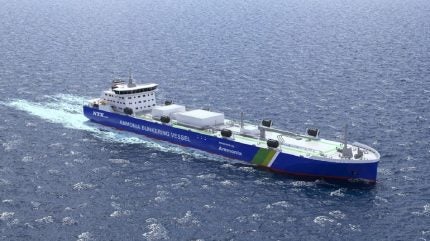
The consortium led by Japanese shipping company Nippon Yusen Kabushiki Kaisha (NYK) has received an approval-in-principle (AiP) from ship classification society Nippon Kaiji Kyokai, also known by its brand name ClassNK, for an ammonia-fuelled bunkering vessel, marking a step in sustainable maritime energy development.
This design, engineered by LMG Marin, a subsidiary of Singaporean shipbuilder Seatrium, is set to be further evaluated by the Maritime and Port Authority of Singapore (MPA).
LMG Marin played a pivotal role in the vessel’s design with its advanced technical expertise.
The Hazard Identification Study (HAZID) conducted by LMG Marin was crucial in achieving the AiP, aligning with the International Maritime Organisation’s safety guidelines for ammonia-fuelled ships.
LMG Marin chairman and Seatrium engineering and technology and new product development executive vice president Aziz Merchant said: “We are honoured to contribute to this industry-leading initiative led by NYK and its partners. The use of ammonia as a non-fossil-based marine fuel is a key distinction in this project.”
The vessel’s design features safety and operational elements, including dual-fuel engines from IHI Power Systems and a bunkering boom by TB Global Technologies.
The engines, which also power the world’s first ammonia-fuelled tugboat, Sakigake, help in significantly minimising greenhouse gas emissions, according to the companies.
The bunkering boom’s high-speed ammonia purging emergency release system (ERS) ensures safe and efficient emergency disconnections, according to the company.
NYK Line executive officer Tsutomu Yokoyama said: “This approval-in-principle represents a critical milestone in our efforts to accelerate the adoption of clean ammonia as a sustainable marine fuel.
“With the rich ammonia expertise of NYK and our partners, as well as the great technical capabilities of Seatrium, we are setting new benchmarks for safety and efficiency while paving the way for a cleaner maritime future.”
Recently, NYK commenced Japan’s inaugural biofuel trial on the coal carrier Noshiro Maru, operated by Tohoku Electric Power, with Mitsubishi Corporation Energy supplying the biofuel in the Keihin region.



